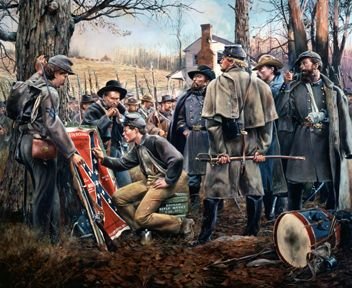
The First Minnesota and the Thirty-Third Virginia
The First Minnesota Regiment arrived behind Ricketts’s gun
line just as his cannoneers were shot down by the fusillade of the Thirty-Third
Virginia. The Minnesota men ran forward thirty yards, stopped, fired a volley
and then came at the Virginians with the bayonet, grappling with them about the
guns, and pushed them back into the open space which is now a parking lot.
Here, for fifteen minutes the two regiments, their numbers dwindling as men
were shot and stabbed, fought each other like mauling lions. First Minnesota Regiment arrived behind Ricketts’s gun
line just as his cannoneers were shot down by the fusillade of the Thirty-Third
Virginia. The Minnesota men ran forward thirty yards, stopped, fired a volley
and then came at the Virginians with the bayonet, grappling with them about the
guns, and pushed them back into the open space which is now a parking lot.
Here, for fifteen minutes the two regiments, their numbers dwindling as men
were shot and stabbed, fought each other like mauling lions.
The First Minnesota suffered forty-two men killed, one
hundred eight wounded, and fifty missing. Its loss was the heaviest of all the
Union regiments on the field. A year later, at the battle of Antietam, the
regiment went into the West Woods with Sedgwick’s division and again suffered
heavy casualties. At Gettysburg, on the second day, Minnesota closed a
dangerous gap in the Union line, charging against a Confederate brigade in
which it lost 215 of the 262 present in the ranks, including its colonel and
all but three of its field officers. On the third day, the remnant of the
regiment charged into the 28th Virginia which had breached the Union line,
capturing its colors. Two soldiers in the ranks received the Medal of Honor for
their exploits that day. The First Minnesota was mustered out of service on April 29, 1864. A number of soldiers reenlisted to form the 1st Minnesota Battalion which
returned to Virginia and served until Appomattox. |

First Minnesota Volleying

|
In its charge across the parking lot toward Griffin’s two guns, and in the subsequent brawl with the First Minnesota, the Thirty-Third
Virginia Regiment lost 45 men killed and 101 wounded. Under Stonewall Jackson
the Thirty-Third Virginia fought at Sharpsburg, Fredericksburg, and Chancellorsville. After Stonewall’s death, it became part of Ewell’s corps and fought at Gettysburg, the Wilderness, and Spotsylvania Courthouse, where it was overrun and captured.
Those that escaped to fight on, continued to Appomattox where only 14 men were
left at the surrender. |

Company A,
Thirty-Third Virginia
The Sixty-Ninth
New York and the Fourth South Carolina
 Late in the
struggle for Ricketts guns, the Sixty-Ninth New York Regiment came up the
Sudley road and charged onto the plateau and slammed into the Fourth South
Carolina that was lying behind a wood fence near Mrs. Henry’s demolished house.
The South Carolinians held the fence for a short time, but the wild rush of the
hurrahing Late in the
struggle for Ricketts guns, the Sixty-Ninth New York Regiment came up the
Sudley road and charged onto the plateau and slammed into the Fourth South
Carolina that was lying behind a wood fence near Mrs. Henry’s demolished house.
The South Carolinians held the fence for a short time, but the wild rush of the
hurrahing  Irishmen, with huge billowing Green flags waving behind them, caused
them to fall back to the pine trees. As they gave up the ground, some of the
men in blue began wrestling several of Ricketts’s guns off the hill, getting
one of them as far as the Sudley road. For a moment, it seemed as if the 69th
had won the battle, the plateau apparently cleared of rebel force. But Jackson’s guns came into play, showered the Irishman with canister. Still, they came,
almost charging right up to the guns. In the midst of the carnage that ensued,
Meagher, who would command the Excelsior Brigade at Antietam, was thrown to the
ground when his horse was killed under him. Leaping up with his sword in his
hand, he cried out to his now faltering regiment—“Look, boys at that flag!
Remember Ireland!” And the regiment lurched forward only to be driven off the
hill as the Fourth South Carolina countercharged with the support of Eighth
South Carolina. The Sixty-Ninth sustained thirty-eight dead, fifty-nine
wounded, and ninety-five missing in the action. The Fourth South Carolina:
Eleven dead, Seventy-nine wounded, six missing. Irishmen, with huge billowing Green flags waving behind them, caused
them to fall back to the pine trees. As they gave up the ground, some of the
men in blue began wrestling several of Ricketts’s guns off the hill, getting
one of them as far as the Sudley road. For a moment, it seemed as if the 69th
had won the battle, the plateau apparently cleared of rebel force. But Jackson’s guns came into play, showered the Irishman with canister. Still, they came,
almost charging right up to the guns. In the midst of the carnage that ensued,
Meagher, who would command the Excelsior Brigade at Antietam, was thrown to the
ground when his horse was killed under him. Leaping up with his sword in his
hand, he cried out to his now faltering regiment—“Look, boys at that flag!
Remember Ireland!” And the regiment lurched forward only to be driven off the
hill as the Fourth South Carolina countercharged with the support of Eighth
South Carolina. The Sixty-Ninth sustained thirty-eight dead, fifty-nine
wounded, and ninety-five missing in the action. The Fourth South Carolina:
Eleven dead, Seventy-nine wounded, six missing.
|
 |
The Parking Lot
Where Lincoln’s Butcher’s Bill Was Highest
The Second Wisconsin

While the 69th NY Regiment was falling back from the fire of
Jackson’s guns, the Second Wisconsin, another of Sherman’s regiments, dressed
in gray, came over the crest of the hill and moved toward the Henry House. As
they reached it, the 79th NY coming up the road behind them, fired upon them as
the rebels, lying in the pine woods and out on the plateau under cover of the
dead artillery horses, tumbled them down with sniper fire. Both sides fired
furious fusillades at each other, the Wisconsin men being shot down by friends
as well as foes. On one side there were shouts of “Give it to em, boys!” On the
other, shouts of “Kill them! Mow them down the Abolition sons of bitches!”
After fifteen minutes of bearing the maelstrom, the Second Wisconsin moved
sullenly off the field. They left behind scattered across the earth,
twenty-four dead, sixty-five wounded, and twenty-three others were nowhere to
be found.

 A year
later, the Second Wisconsin was part of the Iron Brigade and attacked Jackson’s right flank at Brawner’s Farm, the evening of August 29, the engagement resulting
in Richard Ewell losing a leg which the surgeons amputated in the field. At Gettysburg, on the first day, the Second Wisconsin was in the front rank, running past the
Seminary, fixing bayonets as they went, and crashed into Archer’s brigade of
Heth’s division. In the exchange of fire, the regiment’s colonel was shot and
taken to the rear, replaced by the lieutenant colonel who was mortally wounded.
Here, about 1,000 of Archer’s men, including himself, were captured. The Second
Wisconsin fell back to the ridge where Reynolds formed his corps to receive the
renewed attack of the enemy and held their position for several hours, until
the line collapsed from the pressure Ewell brought to bear against its right
flank. In the battle, the Second Wisconsin lost 233 men of 302 engaged. A year
later, the Second Wisconsin was part of the Iron Brigade and attacked Jackson’s right flank at Brawner’s Farm, the evening of August 29, the engagement resulting
in Richard Ewell losing a leg which the surgeons amputated in the field. At Gettysburg, on the first day, the Second Wisconsin was in the front rank, running past the
Seminary, fixing bayonets as they went, and crashed into Archer’s brigade of
Heth’s division. In the exchange of fire, the regiment’s colonel was shot and
taken to the rear, replaced by the lieutenant colonel who was mortally wounded.
Here, about 1,000 of Archer’s men, including himself, were captured. The Second
Wisconsin fell back to the ridge where Reynolds formed his corps to receive the
renewed attack of the enemy and held their position for several hours, until
the line collapsed from the pressure Ewell brought to bear against its right
flank. In the battle, the Second Wisconsin lost 233 men of 302 engaged.
|
|

Company E,
Second Wisconsin Volunteers
Reduced to less
than 100 men by the time it reached Spottsylvania Courthouse
the regiment
was credited with sustaining the greatest percentage of loss
of any regiment
in the Union armies.
The Fourth Alabama |
 |
Its ranks decimated during the fight at Matthews Hill, the
Fourth, though thoroughly wasted by the struggle, came together at the call of
Bee and joined the fray at Henry Hill, just as Bee was mortally shot. The
regiment’s casualties were the second highest: forty dead, one hundred
fifty-nine wounded. The Fourth fought in Virginia and Tennessee and was present
at Appomattox. At the surrender 223 men answered the last roll call. |
The Eighth
Georgia Regiment, Company E
This regiment lost 41 killed and 159 wounded, fighting in
the front yard of the Matthews farmhouse. |

Unknown Reenactors |

Graphic by
Dan Troniani |
| Lincoln’s
“pets:” The Eleventh New York Volunteers |
 |
The regiment
was mustered into service on May 7, 1861 and mustered out in April 1862. It had
been organized by Colonel Elmer Ellsworth in New York City from the members of
the fire department. Its sole experience in action occurred when it was ordered
to ascend the Henry Hill and support Ricketts guns. It did climb the hill, but
almost immediately after arriving it discharged one volley at rebel masses
approaching the guns and then ran back down the hill. It lost its colonel
mortally wounded and forty-eight privates were killed, one hundred and eight
wounded. The regiment spent the remainder of its enlistment (one year) at Newport News and then mustered out in New York. It left most of its flags behind in a trash
heap. |
|

The Fire
Zouaves at Bull Run

The “Fire
Zouaves” of New York City |
Joe Ryan |
